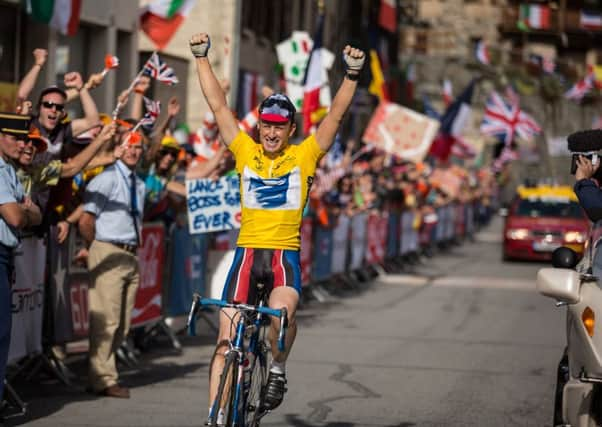Film review: The Program (15)


The Program (15)
Directed by: Stephen Frears
Starring: Ben Foster, Chris O’Dowd, Guillaume Canet, Jesse Plemons
Star rating: ***
At one point during this biopic of Lance Armstrong, the cyclist – played here by a typically great Ben Foster – nonchalantly discusses the rumours that Matt Damon and Jake Gyllenhaal are in the frame to play him in a Hollywood version of his life. Though an amusingly meta moment, it’s also one dripping with dramatic irony: the inspirational sports movie narrative Armstrong has hitherto been crafting for himself – the rising-star athlete struck down by testicular cancer who comes back faster and stronger and goes on to win the Tour de France – masking the darker reality that he’s been doping his way to the top.
Advertisement
Hide AdWith his name now synonymous with cheating, of course, the actual movie version of Armstrong’s life is very different from the version that would likely have been made before his ill-advised comeback at the age of 37 led to the lie finally being exposed. Directed by Stephen Frears, from a script by Trainspotting screenwriter John Hodge, it now has more in common with a political drama, one in which the hero is no longer the sporting star, but the journalist diligently trying to expose the corruption that has sullied the sport since becoming a multi-billion-dollar business.
That journalist is Sunday Times chief sports writer David Walsh and it’s upon his book, Seven Deadly Sins, that The Program is largely based. Even so, Walsh, played here by Chris O’Dowd, is not as prominent in the film as one might expect. Despite his being vilified at the time for his accusations and shunned by colleagues who didn’t want their accreditation revoked, the film isn’t about vindicating Walsh, it’s about trying to nail down what, precisely, drove the still-not-entirely-repentant Armstrong to think he could get away with perpetrating the most sophisticated doping programme in the history of professional sports.
That’s a question Alex Gibney also posed in his 2013 documentary The Armstrong Lie. In that film, the answers procured proved curiously unsatisfactory, partly because Armstrong continued to believe that his victories counted. As he saw it, doping was so prevalent in the sport that his use of performance enhancing drugs didn’t give him any advantage over his fellow riders: it was his athleticism and dedication that made him better than his fellow cheaters.
That type of reasoning suggests a sociopathic mindset and one of the advantages of dramatising Armstrong’s story is the film’s ability to explore this in greater detail. As played by Foster, Armstrong is certainly presented as a ruthless and not particularly nice guy, the sort of opportunist who will do whatever it takes to win and intimidate others into helping him or keeping quiet.
Lacking the natural build or physiology for the sort of stamina races he’s competing in, he seeks out Italian doctor Michele Ferrari (Guillaume Canet), a physician obsessed with exploring the performance-enhancing effects of EPO, a glycoprotein hormone that boosts the ability of the blood to transport oxygen more quickly around the body.
Initially, Ferrari informs Armstrong that he’s all wrong for the sophisticated (and highly illegal) doping programme he’s developed, but when Armstrong is subsequently struck down with testicular cancer, he sees an opportunity during his recovery to rebuild his emaciated body almost from scratch to become the perfect candidate for Ferrari’s experimental treatment – like Marvel’s Captain America reimagined as a pathological narcissist.
Advertisement
Hide AdThe film isn’t crass enough to diminish the seriousness of Armstrong’s suffering during his illness. But after beating cancer, it does suggest that his subsequent exploitation of his illness to remake himself physically – and also from a PR point of view – is symptomatic of his own aggressive determination to win at all costs.
The cancer charity Armstrong sets up becomes the perfect front, allowing him to sell himself with messianic zeal as an ambassador for a sport he’s destroying from within. Indeed, as the film has it, it’s almost is if Armstrong took on the characteristics of his illness, thriving in a sporting body already weakened by doping scandals.
Advertisement
Hide AdFoster is great at teasing out Armstrong’s loathsome nature. He has an uncanny physical resemblance, but it’s the way he carries himself with that air of self-entitlement that really makes the performance. He keeps Armstrong’s arrogance bubbling away just beneath the surface, barely contained, whether he’s dealing with the press or selling young cancer sufferers on the lie that his superhero-like achievements are down to hard work and fighting spirit.
It’s just a shame Stephen Frears’ direction can’t elevate the material around Foster. There’s almost too much ground to cover here and Frears speeds through it all with the same workman-like competence he brought to The Queen, The Deal and Philomena. It’s perfectly watchable, in other words, but it’s not the form-challenging sports movie Armstrong’s story could have been and perhaps should have been.